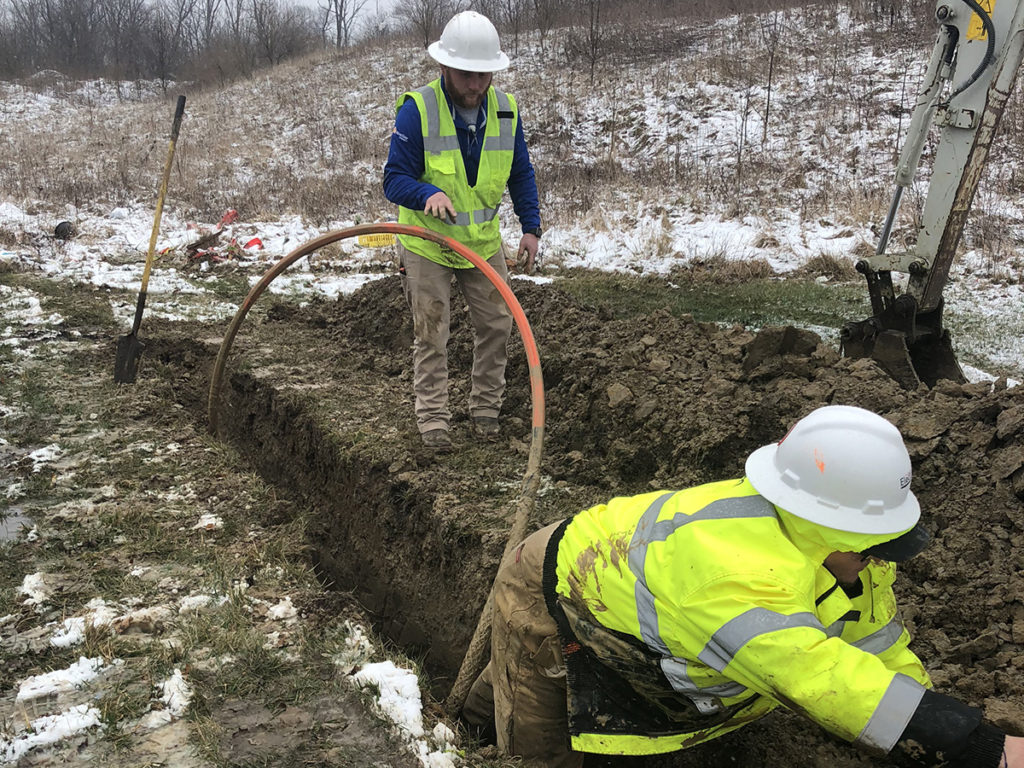
The urgent request from the county’s only hospital came on a Thursday evening: Could the local electric cooperative provide broadband internet access to a new clinic to test patients for COVID-19 by 8 a.m. the following Monday?
On a good day, a crew can excavate and drill around 500 feet of conduit to lay fiber cable. NineStar Connect’s closest connection to the facility was 1,800 feet away.
George Plisinski II, manager of telecom operations for the Greenfield, Indiana-based co-op, described the situation with a baseball analogy: “We were down 9-0 in the bottom of the seventh.”
Curveballs included obtaining state and city permits to bore into a state road and local street; getting gas, water and communication utilities to mark underground lines over the weekend; a late-season wet snow; and broken drilling equipment.
But NineStar Connect was up for the challenge, Plisinski said, because “we live our co-op principles every day and concern for community was right there with us.”
The co-op, which delivers electricity, broadband and water, called on state Sen. Michael Crider, R-Greenfield and a co-op member, to expedite the necessary permits, a process that can take up to a month.
Crider, who chairs the Homeland Security and Transportation Committee, got the Indiana Department of Transportation to approve the permits within minutes.
“That our state senator would ask on our behalf to push a permit through on Friday night set the wheels in motion,” said Plisinski.
Local utilities agreed to waive the 48-hour call-before-you-dig period and worked through the night Friday to mark lines. At daybreak Saturday, six high-pressure gas lines—including one that fed the entire city of Greenfield—along with one 12-inch water pipe and phone lines were “all standing in our path to get where we needed to get,” Plisinski said.
Then came the snow. By nightfall, the co-op crew managed to dig halfway to its connection in heavy slush.
Early on Sunday, the pump on a vacuum excavation system failed, stopping their work. The co-op contacted the mayor, who dispatched two vacuum trucks to the scene, preventing a four-hour wait from another location.
The NineStar Connect crew was running two directional drills when one had mechanical issues, forcing them to use the smaller drill before abandoning that and digging the last 30 feet by hand.
“We’re using shovels and spades, digging it down 3 feet deep,” Plisinski said. “And it’s dark at this point.”
A little after 10:30 p.m. Sunday, March 15, the co-op provided the clinic with broadband internet.
“We stopped by there Monday at 7 a.m.; everything was good to go,” said Plisinski. “Two people were waiting to be seen while we were there before the clinic officially opened.”
NineStar Connect provided multiple-gigabit service through a private connection back to Hancock Regional Hospital. The clinic doctors and staff are using the same software and equipment as they did at the main hospital, which the co-op first connected nearly two decades ago.
“During a pandemic you still have accidents, heart attacks, babies being born. The hospital has to continue to provide those emergency services,” said David Spencer, Ninestar Connect director of marketing and public relations. “The fact that they’ve been able to steer some patients to this clinic is huge.”
The hospital agreed.
“Without the incredible work and dedication from our partners at NineStar Connect, we would not have been able to open and provide care to those that needed us most,” said Jenn Cox, business director for Hancock Health Gateway Services.
“From phones to internet, involving communication, patient flow and documentation was all contingent on having the technology and infrastructure they provided us.”
Cathy Cash is a staff writer at NRECA.
Read more on the electric co-op response to the COVID-19 Pandemic
See NRECA’s COVID-19 hub on cooperative.com for key resources for co-ops, including guidance on business continuity planning and communication, as well as event schedule changes.